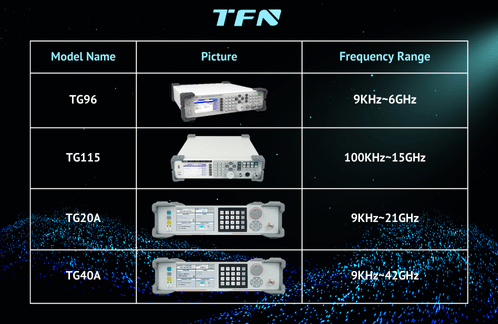The difference between vector signal source and radio frequency signal source
In the field of test and measurement, vector signal sources and radio frequency signal sources are two common signal sources. They have significant differences in signal generation principles, output signal characteristics, and application scenarios. This article will discuss the differences between these two signal sources in detail from these three aspects.
1. Signal generation principle
RF signal source: The RF signal source generates analog signals through analog circuits and electronic components. Its core is the phase-locked loop, which links the frequency of the master oscillator source and the frequency of the reference frequency source through indirect synthesis to achieve frequency stability and calibration. The RF signal source uses an oscillation circuit to generate a frequency-adjustable sine wave signal, and adjusts the amplitude, phase and other parameters through a signal conditioning circuit, and finally outputs it to the object under test through a signal output circuit.
Vector signal source: The vector signal source converts digital signals into analog signals through a digital signal processor (DSP) and a digital-to-analog converter (DAC). It usually has a built-in baseband signal generator and IQ modulator, which can realize the RF conversion of complex modulated signals such as PSK/QAM. The vector signal source converts the 0/1 bit sequence into two IQ baseband signals after constellation mapping, then modulates the local oscillator and the baseband IQ signal, and then adds them to obtain a vector modulated signal.
2. Output signal characteristics
RF signal source: RF signal source can cover a wide frequency range, usually up to several gigahertz (GHz) or more. The signal it generates is usually a continuous analog signal, such as sine wave, square wave, triangle wave, etc., which is suitable for different test requirements. The RF signal source can reduce the interference of harmonics and stray components through the design of modulation circuits and the use of filters, and has low harmonic interference.
Vector signal source: The main feature of the vector signal source is that it can generate complex modulation signals, such as frequency modulation signals, amplitude modulation signals, phase modulation signals, etc. Through digital signal processing technology, the vector signal source can very accurately control the parameters of the signal, such as amplitude, phase, frequency, etc., which improves the accuracy of the signal source. In addition, the vector signal source has the ability to switch and modulate quickly, which is suitable for test scenarios with high timing requirements, such as frequency hopping signal testing.
3. Application scenarios
RF signal source: RF signal source is mainly used for testing and debugging of RF equipment, such as wireless communication equipment, RF circuits, antennas, etc. It can simulate various spurious signals and interference signals to test the anti-interference performance of equipment. RF signal sources can also generate various signal waveforms for testing the sending and receiving performance of communication equipment.
Vector signal source: Vector signal source is widely used in communications, radar, navigation, data links, chip testing and other fields. It can generate complex modulated signals for testing the transmitting and receiving performance of wireless communication systems, such as power, sensitivity, bit error rate, etc. In addition, the vector signal source can also simulate signals of various communication protocols to test the compatibility and performance of the device for communication protocols. In the field of radar, vector signal sources can be used to generate various pulse signals and frequency modulation signals.
In short, there are significant differences between vector signal sources and radio frequency signal sources in terms of signal generation principles, output signal characteristics, and application scenarios. Which signal source to choose depends on the specific test needs and application scenarios.

If you are interested in TFN vector signal source and RF signal source, please contact the TFN sales team:
Email: info@tfngj.com
WhatsApp: +86-18765219251
Facebook: https://www.facebook.com/tfnfate/
